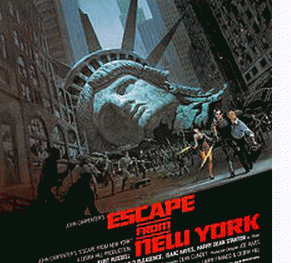"I'm disgusted by what we've become in America. I truly believe there is brain death in this country. Everything we see is designed to sell us something. The only thing they want to do is take our money."--John Carpenter
John Carpenter's films, known primarily for their horror themes,
inevitably feature pulse-pounding soundtracks, slow-moving camera
work and hair-raising jolts to the nervous system as evil pops into
the foreground with unexpected intensity. However, while
Carpenter's films are also infused with a strong
anti-authoritarian, laconic bent, those seeking a good scare tend
to overlook the deeper, overarching themes that speak to the
filmmaker's concerns about the unraveling of our society,
particularly our government.
Carpenter, as author John Muir writes in his insightful
book The Films of John Carpenter , sees the government
working against its own citizens. This theme features prominently
in the films I explore in my new book, A
Government of Wolves: The Emerging American Police State ,
which examines how writers and filmmakers have used science fiction
to forecast the future, hold up a mirror to the present, and most
important of all, engage their audiences in a critical dialogue
about what happens when power, technology and militaristic
governance converge. Yet even among a pantheon of dystopian films
such as Minority Report , Nineteen Eighty-Four ,
The Matrix , and V for Vendetta , Carpenter's work
stands out for its clarity of vision.
Carpenter is a skeptic and critic. But "a close view of
Carpenter's work reveals a romantic streak beneath the skepticism,"
writes Muir, "a belief down deep--far below the anti-establishment
hatred--that a single committed and idealistic person can make a
difference, even if society does not recognize that person as
valuable or good."
In fact, Carpenter's central characters are always out of step
with their times. Underneath their machismo, they still believe in
the ideals of liberty and equal opportunity. Their beliefs place
them in constant opposition with the law and the establishment, but
they are nonetheless freedom fighters. When, for example, John Nada
destroys the alien hyno-transmitter in They Live , he
restores hope by delivering America a wake-up call for
freedom.
This is the theme that runs throughout Carpenter's films--the
belief in American ideals and in people. "He believes that man can
do better," writes Muir, "and his heroes consistently prove that
worthy goals (such as saving the Earth from malevolent
shape-shifters) can be accomplished, but only through
individuality."
Thus, John Carpenter is more than a filmmaker. He is a cultural
analyst. The following are my favorite Carpenter films.
Assault on Precinct 13 (1976): This is a remake of
Howard Hawks' 1959 classic western Rio Bravo--much
beloved by Carpenter. A street gang and assorted criminals surround
and assault a police station. Paranoia abounds as the police are
attacked from all sides and can see no way out. Indeed, Carpenter
repeatedly has his characters comment, in disbelief, that "This
can't happen, not today!" or "We're in the middle of a city " in a
police station " someone will drive by eventually!" Or will
they?
Halloween (1978): This low-budget horror
masterpiece launched Carpenter's career. Acclaimed as the most
successful independent motion picture of all time, the story
centers on a deranged youth who returns to his hometown to conduct
a murderous rampage after fifteen years in an asylum. This film,
which assumes that there is a form of evil so dark that it can't be
killed, deconstructs our technological existence while reminding us
that in the end, we all may have to experience Orwell's stamping
boot on our faces forever.
The Fog (1980): This is a disturbing ghost story
made in the mode of Alfred Hitchcock's The Birds
(1963). Here the menace besieging a small town is not a pack of
winged pests but rather a deadly fog bank that cloaks vengeful,
faceless, evil spirits from which there may be no escape.

theatrical poster from movie Escape From New York
(Image by (Not Known) wikipedia, Author: Author Not Given) Details Source DMCA
theatrical poster from movie Escape From New York by wikipedia
Escape from New York (1981): This is the ultimate
urban nightmare. A ruined Manhattan of the future is an anarchic
prison for America's worst criminals. When the U.S. president is
captured as a hostage, the government sends a disgraced, rebellious
war hero into Manhattan in what seems to be an impossible rescue
mission. In fact, this film sees fascism as the future of
America.
The Thing (1982): Considered by many as one of
Carpenter's best films, this is a remake of the 1951 sci-fi classic
of the same name. A team of scientists in a remote Antarctic
outpost discover a buried spaceship with a ravenous, mutating alien
that eventually creates a claustrophobic, paranoid environment
within their compound. The social commentary is obvious as the
horrible creature literally erupts and bursts out of human flesh.
This film presupposes that increasingly we are all becoming
dehumanized. Thus, in the end, we are all potential aliens.
Christine (1983): This film adaptation of Stephen
King's novel finds a young man with a classic automobile that is
demonically possessed. The car, representing technology with a will
and consciousness of its own, goes on a murderous rampage. Do we
now face the same possibility with the emergence of artificial
intelligence?
Starman (1984): An alien from an advanced
civilization takes on the guise of a young widow's recently
deceased husband. The couple then takes off on a long drive to
rendezvous with the alien spacecraft so he can return home.
Surprisingly, as John Muir recognizes, this film is a Christ
allegory with the alien visitor possessing extraordinary powers to
heal the sick, resurrect the dead, and perform miracles. The
question posed is whether the only hope for humanity is a visitor
from another world.
They Live (1988): This film, which I explore in
greater detail in A Government of Wolves, assumes the future
has already arrived. John Nada is a homeless person who stumbles
across a resistance movement and finds a pair of sunglasses that
enables him to see the real world around him. What he discovers is
a monochrome reality in a world controlled by ominous beings who
bombard the citizens with subliminal messages such as "obey" and
"conform." Carpenter makes an effective political point about the
underclass (everyone except those in power, that is): we, the
prisoners of our devices, are too busy sucking up the entertainment
trivia beamed into our brains and attacking each other to start an
effective resistance movement.
(Note: You can view every article as one long page if you sign up as an Advocate Member, or higher).





